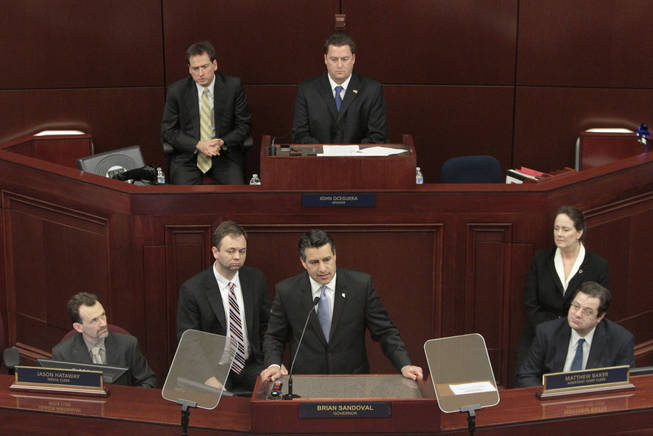
AP Photo/Rich Pedroncelli
Gov. Brian Sandoval makes his first State of the State address before a joint session of the Nevada Legislature in Carson City on Monday, Jan. 24, 2011.
Saturday, Feb. 5, 2011 | 2 a.m.
Sun archives
- Senior programs not spared from cuts in Sandoval budget (2-2-2011)
- Gov. Brian Sandoval’s budget means job, service cuts for Clark County (1-26-2011)
- State budget plan heavy on cuts, light on solutions (1-25-2011)
- Soft words during State of the State hide Nevada in pain (1-25-2011)
- Teachers not pleased with most of Sandoval’s speech (1-25-2011)
- In response, Democrats say taxes might be part of budget solution (1-24-2011)
- State of the State: How doors could open for Nevada (1-24-2011)
- Is Brian Sandoval’s ‘shared-sacrifice’ budget the solution to state’s economic woes? (1-23-2011)
- Most vulnerable await budget cuts with trepidation (1-23-2011)
- Increasingly worried liberals seek pushback on Sandoval budget (1-21-2011)
- Construction industry: Raise taxes for job growth (1-20-2011)
- Groups seek higher taxes on tobacco and gasoline (1-20-2011)
- Sandoval warns of consolidation, job losses in state government (1-19-2011)
In 2009, state legislators passed a law that specifically outlines how to shift government services from one entity to another.
The statute requires that governments be given notice of any changes and says that shifts can’t take place until July after the year in which the changes were announced.
That requirement — NRS 353.203 — puts a wrinkle in Gov. Brian Sandoval’s budget plan.
In last month’s State of the State address, Sandoval proposed dumping on Clark County, as a way to help the state budget, services that cost the state $100 million to provide. But according to the 2009 statute, the county can’t take over any services until July 2012. The new budget year starts July 1, 2011.
It’s unclear whether Sandoval knew about or considered the law while drafting his budget.
Even so, it’s unlikely to delay Sandoval from dropping responsibilities into the county’s lap. Sandoval and the Legislature can write an exemption to the law in their budget bills.
“If this were in the Constitution, it would really tie Sandoval’s hands,” UNLV political scientist David Damore said. “But it’s just a law so he can get around it.”
In 1993, for example, the Legislature passed a bill that requires the state to specify a source of revenue for programs it hoists onto local governments. But the state still manages to shift unfunded mandates to cities and counties. How? Legislators simply add a sentence to bills stating that the 1993 law doesn’t apply.
The process and time line for shifting services among governments were established to make transfers more thoughtful. The waiting period was introduced to give governments time to plan for costs. The law applies to services shifted both to and from the state, as well as between municipalities.
At the time, Nevada was struggling with budget deficits, and local governments anticipated that the state would pass services and costs to them with increasing regularity. Cities and counties also had made several attempts to return service responsibilities to the state. Both entities found the law in their best interest.
“The provision was put in there so you had some orderly way to go about doing it, so you had enough lead time to go about it, and so you could budget for the money,” said Marvin Leavitt, a former lobbyist and chairman of the Committee on Local Government Finance, the body tasked with overseeing service transfers.
There’s no real way Clark County can stop the state from skirting the existing law, but its existence could give county officials and their lobbyists some leverage with which to negotiate a less dramatic hit.
“The fact that it’s in the law gives the counties, the cities and their allies in the Legislature something to hang their hat on,” Damore said. “The statute shows that not everybody is on board” with unfettered service shifts.
Still, in the end, the reality of the state’s economic morass will likely render any opposition meaningless.
“They’ll probably get steamrolled in the last days (of session) when everybody is really scraping for money,” Damore said.

Join the Discussion:
Check this out for a full explanation of our conversion to the LiveFyre commenting system and instructions on how to sign up for an account.
Full comments policy